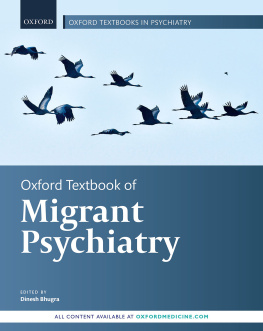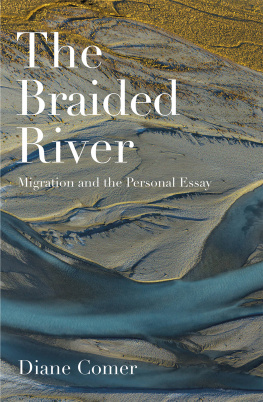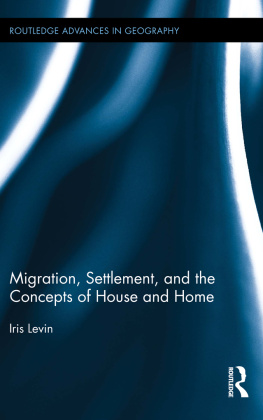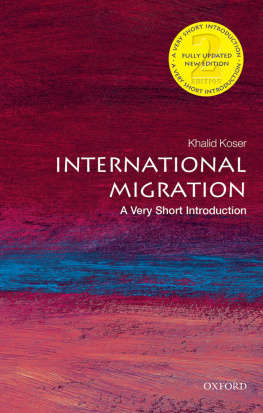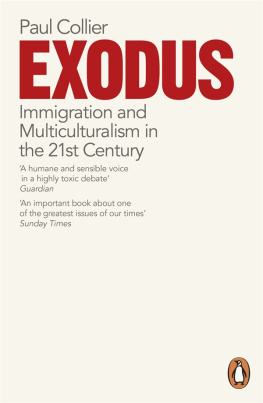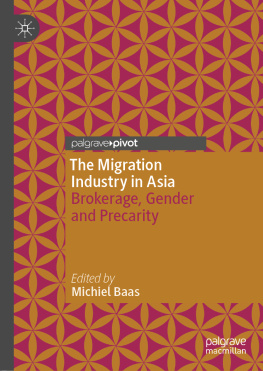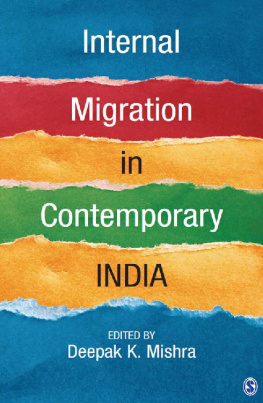Oxford Textbook of
Migrant Psychiatry
OXFORD TEXTBOOKS IN PSYCHIATRY
Oxford Textbook of Migrant Psychiatry
Edited by Dinesh Bhugra
Oxford Textbook of Old Age Psychiatry 2nd edition
Edited by Tom Dening, Alan Thomas, Robert Stewart, and John-Paul Taylor
Oxford Textbook of Psychiatry of Intellectual Disability
Edited by Sabyasachi Bhaumik and Regi Alexander
Oxford Textbook of Inpatient Psychiatry
Alvaro Barrera, Caroline Attard, Rob Chaplin
Oxford Textbook of Attention Deficit Hyperactivity Disorder
Edited by Tobias Banaschewski, David Coghill, and Alessandro Zuddas
Oxford Textbook of Correctional Psychiatry
Edited by Robert Trestman, Kenneth Appelbaum, and Jeffrey Metzner
Oxford Textbook of Community Mental Health
Edited by Graham Thornicroft, George Szmukler, Kim T. Mueser, and Robert E. Drake
Oxford Textbook of Suicidology and Suicide Prevention
Edited by Danuta Wasserman and Camilla Wasserman
Oxford Textbook of Women and Mental Health
Edited by Dora Kohen

Great Clarendon Street, Oxford, OX2 6DP,
United Kingdom
Oxford University Press is a department of the University of Oxford. It furthers the Universitys objective of excellence in research, scholarship, and education by publishing worldwide. Oxford is a registered trade mark of Oxford University Press in the UK and in certain other countries
Oxford University Press 2021
Jessica Kingsley Publishers 2019
The moral rights of the authors have been asserted
First Edition published in 2021
Impression: 1
All rights reserved. No part of this publication may be reproduced, stored in a retrieval system, or transmitted, in any form or by any means, without the prior permission in writing of Oxford University Press, or as expressly permitted by law, by licence or under terms agreed with the appropriate reprographics rights organization. Enquiries concerning reproduction outside the scope of the above should be sent to the Rights Department, Oxford University Press, at the address above
You must not circulate this work in any other form and you must impose this same condition on any acquirer
Published in the United States of America by Oxford University Press
198 Madison Avenue, New York, NY 10016, United States of America
British Library Cataloguing in Publication Data
Data available
Library of Congress Control Number: 2019957195
ISBN 9780198833741
eISBN 9780192570482
Oxford University Press makes no representation, express or implied, that the drug dosages in this book are correct. Readers must therefore always check the product information and clinical procedures with the most up-to-date published product information and data sheets provided by the manufacturers and the most recent codes of conduct and safety regulations. The authors and the publishers do not accept responsibility or legal liability for any errors in the text or for the misuse or misapplication of material in this work. Except where otherwise stated, drug dosages and recommendations are for the non-pregnant adult who is not breast-feeding
Links to third party websites are provided by Oxford in good faith and for information only. Oxford disclaims any responsibility for the materials contained in any third party website referenced in this work.
Dedicated to
Chander and Shashi Narang,
and the family of Narangs,
with affection
Foreword
The number of migrants continues to grow steadily in an increasingly globalized world, owing to a multiplicity of interrelated economic, social, and security factors. While migration can benefit migrants, their families, and both their origin and destination communities, a toxic narrative that tends to stigmatize migrants and consider them a problem rather than a resource dominates the public and political discourse on migration in several countries in Europe and beyond. Developing a better understanding of all aspects of migration can help in demystifying the negative perception of migrants and to support communities in benefiting the most from migration and to better respond to the challenges that it can pose.
In any migration experience, people need to redefine personal, interpersonal, socio-economic, and cultural aspects of their lives, which brings about changes in individual, family, group, and collective identities, roles, and value systems. These psychosocial challenges of migration can be a source of stress and are augmented when migration and displacement are occurring as a result of conflicts, human rights violations, environmental degradation, and natural catastrophes. In addition to the psychological impact these often-protracted situations can have on the affected migrants, undignified travel and transit conditions, family separation, loss of loved ones, difficult bureaucratic procedures to deal with upon arrival, and challenges in the integration process can all take a toll on the migrants psychological well-being. In addition, certain migratory paths, like the ones of victims of human trafficking, of children who travel unaccompanied, of those migrants who are detained for purely administrative reasons can have a profound, long-standing impact on their mental health and psychological well-being.
The consideration that migration as a global reality needs to be addressed, in all its dimensions, has triggered important policy developments at the highest level. A first-ever intergovernmental agreement, the Global Compact for Safe, Orderly and Regular Migration (GCM), was endorsed by the majority of countries in the world and formally endorsed by the United Nations (UN) General Assembly in December 2018. The aspirational Compact aims at reaching a shared collaborative approach to address migration challenges and maximize its benefits, while contributing to positive development outcomes, including towards the achievement of the Sustainable Development Goals. It inter alia advocates for the highest attainable standards of physical and mental health for migrant workers, and for the provision of unrestricted or specific mental health care services for specific migrant groups. These include children, especially unaccompanied and separated children, migrant women and survivors of sexual and gender-based violence, migrants in detentions, and victims of hate crimes. The inclusion of mental health in the GCM is a leap forward in the acknowledgement of mental health as a relevant aspect of international efforts to better manage migration and works towards positive migration outcomes. The Compact calls for action by a wide range of stakeholders, including policymakers, civil society organizations, and equally importantly, international organizations, academia, and the health workforce.
The International Organization for Migration (IOM), was founded in 1951 and became a Related Organization to the UN in 2016. As part of its mandate to protect and promote the human dignity and well-being of migrants, the IOM has provided health services to people on the move throughout all phases of the migration process and has supported governments in both origin, transit, and destination countries. Mental health and psychosocial support have been an integral part of IOM migration health-related services for a wide range of migrant populations, displaced, returnees, and conflict-affected, and host their communities in all parts of the world. By working with partners, member states, migrants, and other key stakeholders, the IOM Mental Health, Psychosocial Support and Intercultural Communication Section was established in the late 1990s to strengthen the capacity of the IOM, partners, and countries in relevant mental health and psychosocial services provided to migrants.

